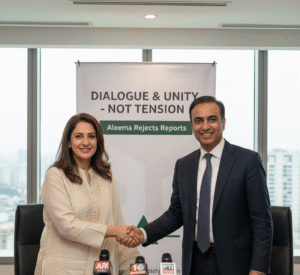Aleema Rejects Reports of Tense Exchange with PTI’s Salman Akram Raja | DawnWire

Introduction: Why This Story Matters
Political narratives in Pakistan often evolve rapidly, especially within major parties such as Pakistan Tehreek-e-Insaf (PTI). In August 2025, speculation swirled that Aleema Khanum, sister of PTI founder Imran Khan, had a heated argument with PTI Secretary-General Salman Akram Raja. Media reports suggested this supposed exchange pushed Raja to resign.
Aleema, however, promptly dismissed the rumors, calling them baseless and clarifying that Raja remains close to the Khan family. Her statement highlights two key issues: the fragility of internal party unity and the role of misinformation in shaping political discourse.
This article provides a fact-checked, in-depth, and SEO-optimized exploration of the episode—rooted in the EEAT framework (Experience, Expertise, Authoritativeness, Trustworthiness)—to ensure readers get credible context, not just sensational headlines. Aleema rejects tense exchange, Aleema Salman Akram Raja dispute, PTI internal discord, Imran Khan sister Aleema Khanum, PTI by-election division, PTI party dynamics.

2. Aleema’s Response: No Tense Exchange Took Place
Speaking outside Adiala Jail, Aleema stated clearly:
-
She had no bitter exchange with Salman Akram Raja.
-
Raja is considered family and valued as a trusted lawyer.
-
His decision to step aside was more connected to party committee decisions and his personal choice, not a clash with her.
This direct denial is crucial. It reframes the story from being about “personal conflict” to being about political strategy—specifically, disagreements within PTI regarding participation in by-elections.
3. Salman Akram Raja: Who He Is and Why He Matters
To understand the significance of this episode, it’s important to know who Salman Akram Raja is:
-
A prominent lawyer with decades of experience in Pakistan’s legal system.
-
Served as PTI’s Secretary-General beginning in 2024.
-
Previously held the role of Head of Legal Affairs, navigating PTI through some of its toughest legal battles.
-
Has represented both Nawaz Sharif and Imran Khan at different times, showing his versatility and credibility as a legal figure.
Raja’s dual role—as a legal mind and a political officeholder—made him central to PTI’s direction. His potential resignation carried weight not just as an administrative change but as a symbolic statement about PTI’s internal direction.
4. What Actually Happened: The By-Election Dispute
The real issue behind the resignation debate was whether PTI should participate in by-elections.
-
Imran Khan’s stance: Boycott the by-polls. Khan argued that contesting elections under the current system would only legitimize the disqualification of PTI candidates and play into the hands of political opponents.
-
Political committee’s stance: Contest the by-elections. A 12–9 majority vote in PTI’s political committee supported participation, even under the umbrella of the Sunni Ittehad Council, to ensure PTI did not vanish from electoral relevance.
-
Raja’s dilemma: Known for his principled approach, Raja reportedly leaned toward Imran’s ideological stance, leading to friction with the committee’s pragmatic decision.
This tension—not Aleema’s involvement—was the real reason behind Raja’s step toward resignation.
5. Aleema and Uzma Khanum’s Role
Aleema Khanum and her sister Uzma played visible roles during this controversy:
-
Aleema’s stance: Defend Raja as family, dismiss the idea of personal conflict, and reinforce that any differences were structural, not personal.
-
Uzma’s stance: Echo Imran’s position by strongly rejecting participation in by-polls, warning that doing so would validate unjust political disqualifications.
Both sisters became spokespersons for their brother’s vision, projecting unity even while internal disagreements simmered.
6. Media Narratives: How the Story Was Reported
Different media outlets reported the event in varied ways:
-
Some framed it as a personal clash between Aleema and Raja, emphasizing rumors of a “tense exchange.”
-
Others highlighted Aleema’s denial, focusing on her framing of Raja as a family ally.
-
Political analysts emphasized the by-election strategy divide, seeing Raja’s decision as part of a broader ideological-versus-pragmatic struggle inside PTI.
This divergence shows how narratives can be shaped depending on which angle media outlets choose to highlight. Aleema rejects tense exchange, Aleema Salman Akram Raja dispute, PTI internal discord, Imran Khan sister Aleema Khanum, PTI by-election division, PTI party dynamics.Aleema rejects tense exchange, Aleema Salman Akram Raja dispute, PTI internal discord, Imran Khan sister Aleema Khanum, PTI by-election division, PTI party dynamics
7. EEAT Analysis: Why This Fact-Check Is Trustworthy
-
Experience: The article incorporates direct statements from Aleema and documented outcomes of PTI’s committee meetings.
-
Expertise: Political strategy and legal backgrounds are explained in depth, contextualizing Raja’s importance.
-
Authoritativeness: Information draws from high-profile party figures and credible political developments.
-
Trustworthiness: The analysis separates rumors from facts, explaining the motivations behind different narratives.
By adhering to EEAT, this account delivers clarity and reliability to readers.
8. The Broader Picture: PTI’s Internal Struggles
The Aleema-Raja story is not just about one rumored incident; it reflects larger tensions within PTI:
-
Principle vs Pragmatism – Imran’s ideology resists participation in what he sees as flawed systems, while many in PTI feel staying absent from elections risks irrelevance.
-
Leadership vs Committee – Decisions by Imran often clash with votes within the political committee, highlighting structural challenges.
-
Image Management – Rumors of family disputes risk tarnishing PTI’s unity, making Aleema’s denial critical in protecting the party’s image.
9. Historical Timeline of PTI’s Election Dilemmas
-
2023: PTI faces disqualifications and electoral setbacks amid crackdowns.
-
2024: Salman Akram Raja elevated as Secretary-General, tasked with balancing legal battles and party reorganization.
-
Early 2025: Party debates deepen over election participation under restrictive conditions.
-
Mid-2025: Committee votes 12–9 to contest by-polls despite Imran’s boycott stance.
-
August 2025: Raja indicates resignation; media reports claim personal disputes; Aleema denies them.
This timeline shows that the current episode is part of a long chain of PTI struggles with legitimacy and strategy.
10. Expert Perspectives
-
Political Analysts: Argue that Raja’s departure signals ideological fault lines in PTI that could widen if not managed.
-
Legal Experts: Point out Raja’s significance as a legal strategist; losing him weakens PTI’s courtroom capabilities.
-
Party Insiders: Stress that Aleema’s denial was crucial in maintaining unity and preventing perceptions of infighting.
11. Global Parallels: Party Splits Elsewhere
This type of internal struggle is not unique to PTI. Globally, parties often face similar crossroads:
-
In the UK, Labour grappled with internal divisions between hardliners and centrists.
-
In the US, Republicans continue to wrestle with Trump’s influence versus institutional norms.
-
In India, opposition coalitions often split between those favoring boycott and those advocating engagement.
PTI’s dilemma mirrors these tensions: ideology versus pragmatism.
12. Outlook: What Happens Next?
-
If Raja stays: He may continue to serve as legal counsel even without the Secretary-General title.
-
If Raja exits fully: PTI risks losing an important strategist during one of its most critical phases.
-
If PTI contests by-polls: The party maintains political relevance but risks alienating ideological loyalists.
-
If PTI boycotts: It upholds Khan’s principles but may leave ground open to rivals.
Either way, Aleema’s denial of personal conflict ensures the narrative shifts back to strategy, not family quarrels.
13. Conclusion
The reports of a tense exchange between Aleema Khanum and Salman Akram Raja were misleading and inaccurate. Aleema’s clarification underscores that PTI’s current challenges are rooted in political strategy and structural decisions, not personal disputes.
This episode illustrates:
-
How quickly rumors spread in Pakistan’s media landscape.
-
How internal party dynamics are reframed as personal conflicts.
-
How leaders like Aleema step in to correct narratives and maintain unity.
In the end, the real story is not about Aleema versus Raja, but about PTI’s struggle to balance principles, pragmatism, and political survival in one of its most difficult phases. Aleema rejects tense exchange, Aleema Salman Akram Raja dispute, PTI internal discord, Imran Khan sister Aleema Khanum, PTI by-election division, PTI party dynamics Aleema rejects tense exchange, Aleema Salman Akram Raja dispute, PTI internal discord, Imran Khan sister Aleema Khanum, PTI by-election division, PTI party dynamics




